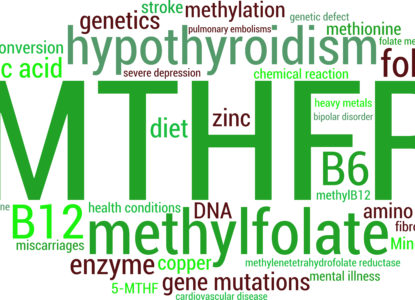How Much of Lactose Intolerance is Caused by Genetics?

Contents
Lactose intolerance is perhaps the most common of all food intolerances, affecting around 36 percent of Americans 1. How our body responds to the presence of lactose in the diet changes dramatically from birth and the greater prevalence of lactose intolerance in some ethnicities indicates a strong genetic link.
However, as we will learn in this post, while the gold standard method of diagnosing lactose intolerance is a genetic test, lactose intolerance can develop for reasons that are unrelated to genetics. Further, lactose intolerance isn’t caused by a “gene mutation,” it is the result, in part, of common SNPs that large percentages of the population carry.
Let’s dig in and learn more.
Lactose intolerance 101
Lactose is the main carbohydrate present in milk. When we eat dairy products, lactose gets broken down by the lactase enzyme into simpler sugars for absorption in the intestines. When you’re not able to digest lactose, dairy products become more of a digestive irritant than a source of nutrition. Symptoms of lactose intolerance can vary based on how much lactase enzyme you produce.
Some of us continue to produce lactase as adults, while others produce such little lactase that any dairy products can cause immediate digestive distress.
See also: Lactose intolerance: can I still eat dairy?
If your lactase levels are moderate to low, you might have a dairy “threshold,” or a maximum amount of lactose you can consume before experiencing symptoms. On the other hand, if your lactase levels are very low, you may not be able to tolerate much lactose at all.
The typical symptoms of lactose intolerance include:
- Nausea
- Cramps
- Gas
- Bloating
- Diarrhea
Lactase non-persistence: The predictor of intolerance
- Lactose is a main source of energy during the nursing period in humans and animals. During this time where milk is the only source of sustenance, the levels of lactase are at an all-time high.
- However, after the weaning phase, lactase activity declines rapidly. This process occurs in the majority of adults. This trait is known as lactase non-persistence (LNP)1.
- In other words, lactose intolerance is the norm!
As a consequence of LNP, the majority of humans are unable to fully digest lactose during adulthood.
It has been estimated that approximately two-thirds of humans are LNP worldwide 2. Well, what about the remaining third? These individuals can fully digest lactose and possess the trait known as lactase persistence (LP).
Interestingly, research has found that the frequency of LP (the ability to digest lactose) is high in northern European populations, decreases across Southern Europe and the Middle East, and is low in Asian and African communities 2.
Is lactose intolerance genetic?
Yes, it very often is.
The distribution of lactase phenotypes (individuals who are LNP or LP) and their associated single nucleotide polymorphisms (SNPs- also known as variations in the genes that direct lactose metabolism), has been extensively studied.
Lactase persistence
These are the individuals who maintain enough lactase production throughout adulthood to digest lactose and enjoy dairy products.
- Lactase persistence is common in descendants from populations that have traditionally practiced cattle domestication.
- Today, there is convincing evidence that the trait of LP has a genetic basis that follows a dominant pattern of inheritance, meaning that only one copy of the gene (as opposed to two), is required for the trait to be observed3.
It is an excellent example of positive selection, meaning that the ability to digest milk adapted to these cattle-rearing populations and was conserved from generation to generation, without experiencing LNP, or lactose intolerance.
Notably, it has been suggested that the ability to digest lactose is independently caused by, at least, five or more SNPs in a region called MCM6 which controls and enhances the expression of the lactase gene.
So yes, there is a genetic case for lactose tolerance, but it has been suggested that the presence of these SNPs cannot explain all the variations in lactase expression that are observed in this population.
Lactase non-persistence
As mentioned previously, LNP or lactose intolerance, is the most common trait in humans, estimated to be in 65–70% of the population 4.
- Lactose intolerance is usually reported only for homozygous individuals (C/C) with SNPs in the MCM6 gene.
- Interestingly, it was found that lactase enzyme activity gradually increases, being lowest in C/C homozygotes, intermediate in T/C heterozygotes, and highest in T/T homozygotes 4.
- This study suggests that heterozygotes may also experience symptoms of lactose intolerance (depending on the age of the individual and the amount of lactose consumed).
Although lactose intolerance has a genetic basis, it is important to note that it is also influenced by several factors that include, but are not limited to:
- The amount of lactose eaten
- The rate of gastric emptying
- The type of food ingested together with the lactose
- The individual’s lactase activity
- The dilution of the lactose load by digestive juices
- The rate of contact with the mucosal surface
- The ability of the digestive bacteria to ferment unabsorbed lactose,
- Sensitivity of the colon to distension by gas formation
Can you use genetic testing to diagnose lactose intolerance?
Yes, genetic testing is the most accurate way of diagnosing lactose intolerance.
Independent of the factors mentioned above, a genetic variation in the lactase gene, or its ‘controller’(MCM6), can be tested for by genetic screening if the lactose intolerance is hereditary (primary lactose malabsorption). We test for MCM6 genes and for lactose intolerance in our custom nutrition plan product.
Secondary lactose intolerance
This may seem obvious, but secondary lactose malabsorption is independent of genetics, in other words, intolerance can be enhanced by insults such as:
- Celiac disease
- Gastroenteritis
- Giardiasis
- Crohn’s disease of the small bowel
Therefore, it’s important to determine whether your intolerance is primary or secondary in nature.
Hypolactasia is the condition associated with severe lactose intolerance and is genetically determined by the presence of the C/T−13910 polymorphism (C/C homozygotes). A study was done to determine the correlation between this genetic test and the lactose breath test 5:
Are lactose breath tests reliable?
If you’re not familiar with the lactose breath test, it’s a widely used diagnostic tool for lactose absorption testing. This test depends on the activity of the intestinal bacterial flora in fermenting undigested lactose and producing CO2, H2, and CH4 gases a result. The more gas produced, the more intolerant an individual is, however, the response of the individual to digest lactose can differ from day to day depending on external factors, making the test unreliable.
This study found a moderate agreement between the combined lactose breath test and the genetic test in patients with lactose intolerance.
So, if you suspect that you have lactose intolerance, it’s probably a good idea to go for the genetic test, since it’s much more reliable.
Closing thoughts
- As we grow from children to adults, our production of lactase decreases regardless of genotype.
- However, some of us produce more lactase than others, and the continued production of lactase into adulthood explains why some people can eat dairy with no issues, and other have a terrible time.
- Lactose intolerance has a strong genetic link, but it’s also important to keep in mind that secondary factors, such as celiac and Crohn’s disease can cause lactose intolerance even when the telltale genetic markers are absent.



